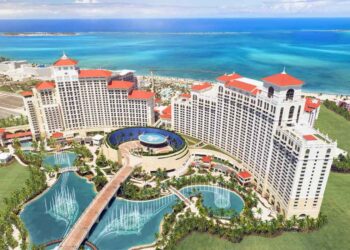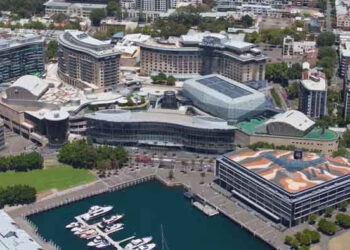More bad news has hit Macau gaming stocks in the wake of a report that Xi Jinping’s corruption crackdown is zeroing in on money illicitly channeled through the city’s casinos.
The report in the South China Morning Post comes on the eve of the Chinese president’s highly anticipated visit to the gambling enclave, the only place in China where casinos are legal, for celebrations marking the 15th anniversary of the former Portuguese colony’s return to the People’s Republic of China.
Macau gaming revenues have been in a veritable free fall since June, and the stocks of the six publicly traded operating concessions have shed US$75 billion of market value as a result, according to Bloomberg calculations. Mr Xi’s wide-ranging assault on corruption and graft has combined with stepped-up enforcement of existing travel restrictions and a slowing economy and tighter credit conditions on the mainland to decimate the VIP wagering that generates two-thirds of the city’s world-leading gambling take.
Mr Xi’s visit also comes at a time when mainland officials are speaking in increasingly blunt terms of the need for Macau to diversify away from its dependence on gambling for its own benefit and that of the nation. The industry, which generated more than US$45 billion in gaming revenue last year, accounted for more than 80% of all Macau public revenue over the same period.
Analysts, however, expect December will continue a trend of double-digit declines in gaming compared with last year, and investors are bracing for the first annual revenue decline since the market opened to competition a decade ago. And the effects are spreading into the larger economy, which suffered a 2.1% decline in GDP in the third quarter, the first year-on-year drop since the 2008-2009 global financial crisis.
The latest blow was delivered with the Post’s report, which said the Economic Crimes Investigation Bureau of China’s Ministry of Public Security is leading a probe into capital flight—a prime target of the anti-corruption drive—through the casinos and the junkets that control the VIP trade.
The Post said the bureau has sent representatives to meet with local regulators and law enforcement agencies to discuss “criminal activities” involving the mainland’s popular state-backed UnionPay bank card, reportedly a major resource for mainland visitors to evade the country’s strict limits on yuan exports through activities such as bogus purchases of jewelry, watches and other high-priced goods, many conducted on smuggled point-of-sale devices.
Beijing also has been moving aggressively to secure the return of corrupt party and corporate officials who have fled overseas with money illegally funneled out of the country, and the Public Security Ministry has met with representatives from 18 provinces and cities to discuss steps to crack down on money laundering related to gambling overseas, the ministry organ China Police Daily has reported.
The Post cited documents indicating that Macau’s Monetary Authority has summoned top bankers in the city to a meeting next month as part of the crackdown. In a note sent on Tuesday, the regulators told bankers they would “explain a live monitoring system” which will give the ministry unprecedented access to all transfers through UnionPay to identify suspicious transactions.
Galaxy Entertainment Group (HKSE: 0027) fell 8.2% on the news. MGM China Holdings (2282) was down 7%, and Sands China (1928) and SJM Holdings (0880) both dropped 6.2%. Wynn Macau (1128) lost 4.3%. Melco Crown Entertainment (Nasdaq: MPEL) was down 3.9%.
The casinos will be affected “potentially profoundly, depending on the extent to which this is enforced,” Standard Chartered analyst Philip Tulk told Bloomberg.
“This is causing a lot of concern,” an individual identified as a “gaming insider” told the Post anonymously. “It seems Beijing means business, and it’s not just the VIP junket operators who bring in the high-rollers who are nervous.”
“The sector will be under great pressure going forward,” Lantis Li, an analyst at Capital Securities Corp., told Bloomberg, adding that investors are awaiting Mr Xi’s comments in Macau for any signs of his future direction for the city, which like Hong Kong enjoys a higher degree of autonomy and personal freedom than any mainland province as a self-governing “special administrative region” of the PRC.
Mr. Xi’s visit comes at a time of strained relations between China and the people of neighboring Hong Kong, whose central business district was occupied for more than two months this fall by student activists demanding a more democratic government to combat the city’s shocking wealth gap. The ripples of the “Occupy Central” movement, as it’s called, have since spread to Taiwan, which China considers a renegade province and where voters dealt a huge defeat to the pro-PRC governing Kuomintang in local elections in November.
Macau also is becoming increasingly restive. Wages have risen dramatically in the post-monopoly era, but soaring property prices have rendered those gains meaningless for middle- and lower-income workers. Education, health care and the physical infrastructure are seen by many as outdated and inadequate. Casino workers took to the streets eight times this year to demand better pay and working conditions. In May, thousands rallied to protest the local government’s plans to give generous retirement perks to officials and to grant the city’s top leader, known as the chief executive, immunity from criminal prosecution. Over the summer, two university professors lost their jobs for expressing political views. In August, five activists were arrested for attempting to hold an unofficial public referendum on the performance of Chief Executive Chui Sai On, who later that month would go on to be re-elected unopposed by a committee of mostly pro-Beijing elites.
“The mistakes [China] made in Hong Kong they cannot make here,” an advisor to the Macau government told The Wall Street Journal.
Jacky So, the University of Macau’s dean of the faculty of business administration, told the Journal that Macau citizens have a “love/hate mentality” regarding the breakneck economic development that casinos have brought over the past decade. “The real-estate industry dominates too much in Hong Kong, just like the casinos in Macau,” he said. “You need to diversify. It’s not healthy.”
The first cracks in the industry’s massive, multi-layered junket network and its investors—which together function as a shadow banking system handling tens of billions of dollars in high-roller transactions annually through the dispensing and collection of credit—appeared at the end of 2012, shortly after the Xi regime ascended to power, when several operatives were questioned by mainland officials in connection with the prosecution of disgraced Communist Party high-flier Bo Xilai.
Then early in 2013 it was reported that law enforcement in Hong Kong had launched a wide-ranging probe of their own into the junkets as part of the trial, conviction and imprisonment of junket investor and sportsman Carson Yeung on money-laundering charges.
The next bombshell came earlier this year when a junket operative fled with HK$8 billion in investor funds reputedly earmarked for “side betting,” a term for off-the-books wagers that are said to be routinely conducted on a large scale in the casinos’ VIP rooms.
Last week, it was reported that Cheung Chi Tai, a major shareholder in the Neptune Guangdong Group, one of Macau’s largest junkets, has been targeted in a money laundering investigation in Hong Kong. The report said Mr Cheung’s assets and those of seven of his companies have been frozen in connection with the probe.






























